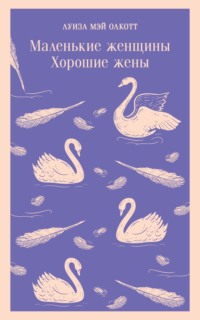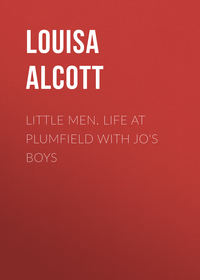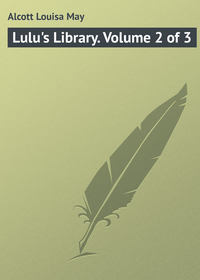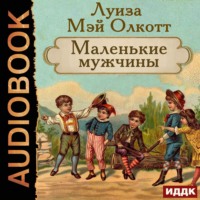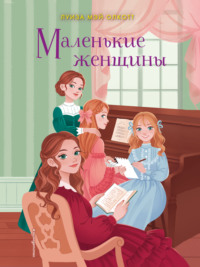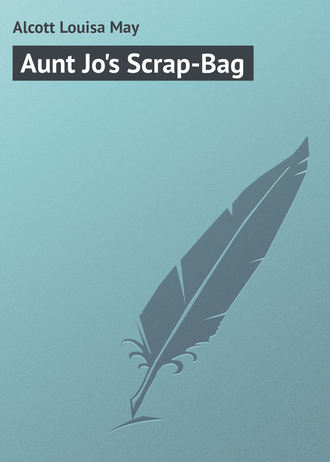 полная версия
полная версияAunt Jo's Scrap-Bag
He got my trunks, put me into a carriage, and as we rolled merrily away I asked how he chanced to meet me so unexpectedly. Knowing where I intended to stay, he had called occasionally till I notified Madame D. of the day and hour of my arrival, and then he had come to 'make the fine surprise.' He enjoyed the joke like a true boy, and I was glad to see how well he looked, and how gay he seemed.
'You are better?' I said.
'I truly hope so. The winter was good to me and I cough less. It is a small hope, but I do not enlarge my fear by a sad face. I yet work and save a little purse, so that I may not be a heaviness to those who have the charity to finish me if I fall back and yet die.'
I would not hear of that, and told him he looked as well and happy as if he had found a fortune.
He laughed, and answered with his fine bow, 'I have. Behold, you come to make the fête for me. I find also here my friends Joseph and Napoleon. Poor as mouses of the church, as you say, but brave boys, and we work together with much gaiety.'
When I asked if he had leisure to be my guide about Paris, for my time was short and I wanted to see everything; he pranced, and told me he had promised himself a holiday, and had planned many excursions the most wonderful, charming, and gay. Then, having settled me at Madame's, he went blithely away to what I afterwards discovered were very poor lodgings, across the river.
Next day began the pleasantest fortnight in all my year of travel. Laddie appeared early, elegant to behold, in a new hat and buff gloves, and was immensely amused because the servant informed me that my big son had arrived.
I believe the first thing a woman does in Paris is to buy a new bonnet. I did, or rather stood by and let 'my son' do it in the best of French, only whispering when he proposed gorgeous chapeaus full of flowers and feathers, that I could not afford it.
'Ah! we must make our economies, must we? See, then, this modest, pearl-colored one, with the crape rose. Yes, we will have that, and be most elegant for the Sunday promenade.'
I fear I should have bought a pea-green hat with a yellow plume if he had urged it, so wheedlesome and droll were his ways and words. His good taste saved me, however, and the modest one was sent home for the morrow, when we were to meet Joseph and Napoleon and go to the concert in the Tuileries garden.
Then we set off on our day of sight-seeing, and Laddie proved himself an excellent guide. We had a charming trip about the enchanted city, a gay lunch at a café, and a first brief glimpse of the Louvre. At dinner-time I found a posy at my place; and afterward Laddie came and spent the evening in my little salon, playing to me, and having what he called 'babblings and pleasantries.' I found that he was translating 'Vanity Fair' into Polish, and intended to sell it at home. He convulsed me with his struggles to put cockney English and slang into good Polish, for he had saved up a list of words for me to explain to him. Hay-stack and bean-pot were among them, I remember; and when he had mastered the meanings he fell upon the sofa exhausted.
Other days like this followed, and we led a happy life together: for my twelve years' seniority made our adventures quite proper, and I fearlessly went anywhere on the arm of my big son. Not to theatres or balls, however, for heated rooms were bad for Laddie, but pleasant trips out of the city in the bright spring weather, quiet strolls in the gardens, moonlight concerts in the Champs Elysées; or, best of all, long talks with music in the little red salon, with the gas turned low, and the ever-changing scenes of the Rue de Rivoli under the balcony.
Never were pleasures more cheaply purchased or more thoroughly enjoyed, for our hearts were as light as our purses, and our 'little economies' gave zest to our amusements.
Joseph and Napoleon sometimes joined us, and I felt in my element with the three invalid soldier boys, for Napoleon still limped with a wound received in the war, Joseph had never recovered from his two years' imprisonment in an Austrian dungeon, and Laddie's loyalty might yet cost him his life.
Thanks to them, I discovered a joke played upon me by my 'polisson'. He told me to call him 'ma drogha,' saying it meant 'my friend,' in Polish. I innocently did so, and he seemed to find great pleasure in it, for his eyes always laughed when I said it. Using it one day before the other lads, I saw a queer twinkle in their eyes, and suspecting mischief, demanded the real meaning of the words. Laddie tried to silence them, but the joke was too good to keep, and I found to my dismay that I had been calling him 'my darling' in the tenderest manner.
How the three rascals shouted, and what a vain struggle it was to try and preserve my dignity when Laddie clasped his hands and begged pardon, explaining that jokes were necessary to his health, and he never meant me to know the full baseness of this 'pleasantrie!' I revenged myself by giving him some bad English for his translation, and telling him of it just as I left Paris.
It was not all fun with my boy, however; he had his troubles, and in spite of his cheerfulness he knew what heartache was. Walking in the quaint garden of the Luxembourg one day, he confided to me the little romance of his life. A very touching little romance as he told it, with eloquent eyes and voice and frequent pauses for breath. I cannot give his words, but the simple facts were these: – He had grown up with a pretty cousin, and at eighteen was desperately in love with her. She returned his affection, but they could not be happy, for her father wished her to marry a richer man. In Poland, to marry without the consent of parents is to incur lasting disgrace; so Leonore obeyed, and the young pair parted. This had been a heavy sorrow to Laddie, and he rushed into the war, hoping to end his trouble.
'Do you ever hear from your cousin?' I asked, as he walked beside me, looking sadly down the green aisles where kings and queens had loved and parted years ago.
'I only know that she suffers still, for she remembers. Her husband submits to the Russians, and I despise him as I have no English to tell;' and he clenched his hands with the flash of the eye and sudden kindling of the whole face that made him handsome.
He showed me a faded little picture, and when I tried to comfort him, he laid his head down on the pedestal of one of the marble queens who guard the walk, as if he never cared to lift it up again.
But he was all right in a minute, and bravely put away his sorrow with the little picture. He never spoke of it again, and I saw no more shadows on his face till we came to say good-bye.
'You have been so kind to me, I wish I had something beautiful to give you, Laddie,' I said, feeling that it would be hard to get on without my boy.
'This time it is for always; so, as a parting souvenir, give to me the sweet English good-bye.'
As he said this, with a despairing sort of look, as if he could not spare even so humble a friend as myself, my heart was quite rent within me, and, regardless of several prim English ladies, I drew down his tall head and kissed him tenderly, feeling that in this world there were no more meetings for us. Then I ran away and buried myself in an empty railway carriage, hugging the little cologne bottle he had given me.
He promised to write, and for five years he has kept his word, sending me from Paris and Poland cheery, bright letters in English, at my desire, so that he might not forget. Here is one as a specimen.
'My Dear and Good Friend, – What do you think of me that I do not write so long time? Excuse me, my good mamma, for I was so busy in these days I could not do this pleasant thing. I write English without the fear that you laugh at it, because I know it is more agreeable to read the own language, and I think you are not excepted of this rule. It is good of me, for the expressions of love and regard, made with faults, take the funny appearance; they are ridicule, and instead to go to the heart, they make the laugh. Never mind, I do it.
'You cannot imagine yourself how stupide is Paris when you are gone. I fly to my work, and make no more fêtes, – it is too sad alone. I tie myself to my table and my Vanity (not of mine, for I am not vain, am I?). I wish some chapters to finish themselfs vite, that I send them to Pologne and know the end. I have a little question to ask you (of Vanity as always). I cannot translate this, no one of dictionnaires makes me the words, and I think it is jargon de prison, this little period. Behold: —
Mopy, is that your snum?Nubble your dad and gully the dog, &c.'So funny things I cannot explain myself, so I send to you, and you reply sooner than without it, for you have so kind interest in my work you do not stay to wait. So this is a little hook for you to make you write some words to your son who likes it so much and is fond of you.
'My doctor tells me my lungs are soon to be re-established; so you may imagine yourself how glad I am, and of more courage in my future. You may one day see your Varjo in Amerique, if I study commerce as I wish. So then the last time of seeing ourselves is not the last. Is that to please you? I suppose the grand histoire is finished, n'est ce pas? You will then send it to me care of M. Gryhomski Austriche, and he will give to me in clandestine way at Varsovie, otherwise it will be confiscated at the frontier by the stupide Russians.
'Now we are dispersed in two sides of world far apart, for soon I go home to Pologne and am no more "juif errant." It is now time I work at my life in some useful way, and I do it.
'As I am your grand fils, it is proper that I make you my compliment of happy Christmas and New Year, is it not? I wish for you so many as they may fulfil long human life. May this year bring you more and more good hearts to love you (the only real happiness in the hard life), and may I be as now, yours for always,
'Varjo.'A year ago he sent me his photograph and a few lines. I acknowledged the receipt of it, but since then not a word has come, and I begin to fear that my boy is dead. Others have appeared to take his place, but they don't suit, and I keep his corner always ready for him if he lives. If he is dead, I am glad to have known so sweet and brave a character, for it does one good to see even as short-lived and obscure a hero as my Polish boy, whose dead December rose embalms for me the memory of Varjo, the last and dearest of my boys.
It is hardly necessary to add, for the satisfaction of inquisitive little women, that Laddie was the original of Laurie, as far as a pale pen-and-ink sketch could embody a living, loving boy.
TESSA'S SURPRISES
I
Little Tessa sat alone by the fire, waiting for her father to come home from work. The children were fast asleep, all four in the big bed behind the curtain; the wind blew hard outside, and the snow beat on the window-panes; the room was large, and the fire so small and feeble that it didn't half warm the little bare toes peeping out of the old shoes on the hearth.
Tessa's father was an Italian plaster-worker, very poor, but kind and honest. The mother had died not long ago, and left twelve-year old Tessa to take care of the little children. She tried to be very wise and motherly, and worked for them like any little woman; but it was so hard to keep the small bodies warm and fed, and the small souls good and happy, that poor Tessa was often at her wits' end. She always waited for her father, no matter how tired she was, so that he might find his supper warm, a bit of fire, and a loving little face to welcome him. Tessa thought over her troubles at these quiet times, and made her plans; for her father left things to her a good deal, and she had no friends but Tommo, the harp-boy upstairs, and the lively cricket who lived in the chimney. To-night her face was very sober, and her pretty brown eyes very thoughtful as she stared at the fire and knit her brows, as if perplexed. She was not thinking of her old shoes, nor the empty closet, nor the boys' ragged clothes just then. No; she had a fine plan in her good little head, and was trying to discover how she could carry it out.
You see, Christmas was coming in a week; and she had set her heart on putting something in the children's stockings, as the mother used to do, for while she lived things were comfortable. Now Tessa had not a penny in the world, and didn't know how to get one, for all the father's earnings had to go for food, fire, and rent.
'If there were only fairies, ah! how heavenly that would be; for then I should tell them all I wish, and, pop! behold the fine things in my lap!' said Tessa to herself. 'I must earn the money; there is no one to give it to me, and I cannot beg. But what can I do, so small and stupid and shy as I am? I must find some way to give the little ones a nice Christmas. I must! I must!' and Tessa pulled her long hair, as if that would help her think.
But it didn't, and her heart got heavier and heavier; for it did seem hard that in a great city full of fine things, there should be none for poor Nono, Sep, and little Speranza. Just as Tessa's tears began to tumble off her eyelashes on to her brown cheeks, the cricket began to chirp. Of course, he didn't say a word; but it really did seem as if he had answered her question almost as well as a fairy; for, before he had piped a dozen shrill notes, an idea popped into Tessa's head – such a truly splendid idea that she clapped her hands and burst out laughing. 'I'll do it! I'll do it! if father will let me,' she said to herself, smiling and nodding at the fire. 'Tommo will like to have me go with him and sing, while he plays his harp in the streets. I know many songs, and may get money if I am not frightened; for people throw pennies to other little girls who only play the tambourine. Yes, I will try; and then, if I do well, the little ones shall have a Merry Christmas.'
So full of her plan was Tessa that she ran upstairs at once, and asked Tommo if he would take her with him on the morrow. Her friend was delighted, for he thought Tessa's songs very sweet, and was sure she would get money if she tried.
'But see, then, it is cold in the streets; the wind bites, and the snow freezes one's fingers. The day is very long, people are cross, and at night one is ready to die with weariness. Thou art so small, Tessa, I am afraid it will go badly with thee,' said Tommo, who was a merry, black-eyed boy of fourteen, with the kindest heart in the world under his old jacket.
'I do not mind cold and wet, and cross people, if I can get the pennies,' answered Tessa, feeling very brave with such a friend to help her. She thanked Tommo, and ran away to get ready, for she felt sure her father would not refuse her anything. She sewed up the holes in her shoes as well as she could, for she had much of that sort of cobbling to do; she mended her only gown, and laid ready the old hood and shawl which had been her mother's. Then she washed out little Ranza's frock and put it to dry, because she would not be able to do it the next day. She set the table and got things ready for breakfast, for Tommo went out early, and must not be kept waiting for her. She longed to make the beds and dress the children over night, she was in such a hurry to have all in order; but, as that could not be, she sat down again, and tried over all the songs she knew. Six pretty ones were chosen; and she sang away with all her heart in a fresh little voice so sweetly that the children smiled in their sleep, and her father's tired face brightened as he entered, for Tessa was his cheery cricket on the hearth. When she had told her plan, Peter Benari shook his head, and thought it would never do; but Tessa begged so hard, he consented at last that she should try it for one week, and sent her to bed the happiest little girl in New York.
Next morning the sun shone, but the cold wind blew, and the snow lay thick in the streets. As soon as her father was gone, Tessa flew about and put everything in nice order, telling the children she was going out for the day, and they were to mind Tommo's mother, who would see about the fire and the dinner; for the good woman loved Tessa, and entered into her little plans with all her heart. Nono and Giuseppe, or Sep, as they called him, wondered what she was going away for, and little Ranza cried at being left; but Tessa told them they would know all about it in a week, and have a fine time if they were good; so they kissed her all round and let her go.
Poor Tessa's heart beat fast as she trudged away with Tommo, who slung his harp over his shoulder, and gave her his hand. It was rather a dirty hand, but so kind that Tessa clung to it, and kept looking up at the friendly brown face for encouragement.
'We go first to the café, where many French and Italians eat the breakfast. They like my music, and often give me sips of hot coffee, which I like much. You too shall have the sips, and perhaps the pennies, for these people are greatly kind,' said Tommo, leading her into a large smoky place where many people sat at little tables, eating and drinking. 'See, now, have no fear; give them "Bella Monica;" that is merry and will make the laugh,' whispered Tommo, tuning his harp.
For a moment Tessa felt so frightened that she wanted to run away; but she remembered the empty stockings at home, and the fine plan, and she resolved not to give it up. One fat old Frenchman nodded to her, and it seemed to help her very much; for she began to sing before she thought, and that was the hardest part of it. Her voice trembled, and her cheeks grew redder and redder as she went on; but she kept her eyes fixed on her old shoes, and so got through without breaking down, which was very nice. The people laughed, for the song was merry; and the fat man smiled and nodded again. This gave her courage to try another, and she sung better and better each time; for Tommo played his best, and kept whispering to her, 'Yes; we go well; this is fine. They will give the money and the blessed coffee.'
So they did; for, when the little concert was over, several men put pennies in the cap Tessa offered, and the fat man took her on his knee, and ordered a mug of coffee, and some bread and butter for them both. This quite won her heart; and when they left the café, she kissed her hand to the old Frenchman, and said to her friend, 'How kind they are! I like this very much; and now it is not hard.'
But Tommo shook his curly head, and answered, soberly, 'Yes, I took you there first, for they love music, and are of our country; but up among the great houses we shall not always do well. The people there are busy or hard or idle, and care nothing for harps and songs. Do not skip and laugh too soon; for the day is long, and we have but twelve pennies yet.'
Tessa walked more quietly, and rubbed her cold hands, feeling that the world was a very big place, and wondering how the children got on at home without the little mother. Till noon they did not earn much, for every one seemed in a hurry, and the noise of many sleigh-bells drowned the music. Slowly they made their way up to the great squares where the big houses were, with fine ladies and pretty children at the windows. Here Tessa sung all her best songs, and Tommo played as fast as his fingers could fly; but it was too cold to have the windows open, so the pretty children could not listen long, and the ladies tossed out a little money, and soon went back to their own affairs.
All the afternoon the two friends wandered about, singing and playing, and gathering up their small harvest. At dusk they went home, Tessa so hoarse she could hardly speak, and so tired she fell asleep over her supper. But she had made half a dollar, for Tommo divided the money fairly, and she felt rich with her share. The other days were very much like this; sometimes they made more, sometimes less, but Tommo always 'went halves;' and Tessa kept on, in spite of cold and weariness, for her plans grew as her earnings increased, and now she hoped to get useful things, instead of candy and toys alone.
On the day before Christmas she made herself as tidy as she could, for she hoped to earn a good deal. She tied a bright scarlet handkerchief over the old hood, and the brilliant color set off her brown cheeks and bright eyes, as well as the pretty black braids of her hair. Tommo's mother lent her a pair of boots so big that they turned up at the toes, but there were no holes in them, and Tessa felt quite elegant in whole boots. Her hands were covered with chilblains, for she had no mittens; but she put them under her shawl, and scuffled merrily away in her big boots, feeling so glad that the week was over, and nearly three dollars safe in her pocket. How gay the streets were that day! how brisk every one was, and how bright the faces looked, as people trotted about with big baskets, holly-wreaths, and young evergreens going to blossom into splendid Christmas trees!
'If I could have a tree for the children, I'd never want anything again. But I can't; so I'll fill the socks all full, and be happy,' said Tessa, as she looked wistfully into the gay stores, and saw the heavy baskets go by.
'Who knows what may happen if we do well?' returned Tommo, nodding wisely, for he had a plan as well as Tessa, and kept chuckling over it as he trudged through the mud. They did not do well somehow, for every one seemed so full of their own affairs they could not stop to listen, even to 'Bella Monica,' but bustled away to spend their money in turkeys, toys, and trees. In the afternoon it began to rain, and poor Tessa's heart to fail her; for the big boots tired her feet, the cold wind made her hands ache, and the rain spoilt the fine red handkerchief. Even Tommo looked sober, and didn't whistle as he walked, for he also was disappointed, and his plan looked rather doubtful, the pennies came in so slowly.
'We'll try one more street, and then go home, thou art so tired, little one. Come; let me wipe thy face, and give me thy hand here in my jacket pocket; there it will be as warm as any kitten;' and kind Tommo brushed away the drops which were not all rain from Tessa's cheeks, tucked the poor hand into his ragged pocket, and led her carefully along the slippery streets, for the boots nearly tripped her up.
II
At the first house, a cross old gentleman flapped his newspaper at them; at the second, a young gentleman and lady were so busy talking that they never turned their heads, and at the third, a servant came out and told them to go away, because some one was sick. At the fourth, some people let them sing all their songs and gave nothing. The next three houses were empty; and the last of all showed not a single face as they looked up anxiously. It was so cold, so dark and discouraging, that Tessa couldn't help one sob; and, as he glanced down at the little red nose and wet figure beside him, Tommo gave his harp an angry thump, and said something very fierce in Italian. They were just going to turn away; but they didn't, for that angry thump happened to be the best thing they could have done. All of a sudden a little head appeared at the window, as if the sound had brought it; then another and another, till there were five, of all heights and colors, and five eager faces peeped out, smiling and nodding to the two below.
'Sing, Tessa; sing! Quick! quick!' cried Tommo, twanging away with all his might, and showing his white teeth, as he smiled back at the little gentle-folk.
Bless us! How Tessa did tune up at that! She chirped away like a real bird, forgetting all about the tears on her cheeks, the ache in her hands, and the heaviness at her heart. The children laughed, and clapped their hands, and cried 'More! more! Sing another, little girl! Please do!' And away they went again, piping and playing, till Tessa's breath was gone, and Tommo's stout fingers tingled well.
'Mamma says, come to the door; it's too muddy to throw the money into the street!' cried out a kindly child's voice as Tessa held up the old cap, with beseeching eyes.
Up the wide stone steps went the street musicians, and the whole flock came running down to give a handful of silver, and ask all sorts of questions. Tessa felt so grateful that, without waiting for Tommo, she sang her sweetest little song all alone. It was about a lost lamb, and her heart was in the song; therefore she sang it well, so well that a pretty young lady came down to listen, and stood watching the bright-eyed girl, who looked about her as she sang, evidently enjoying the light and warmth of the fine hall, and the sight of the lovely children with their gay dresses, shining hair, and dainty little shoes.



